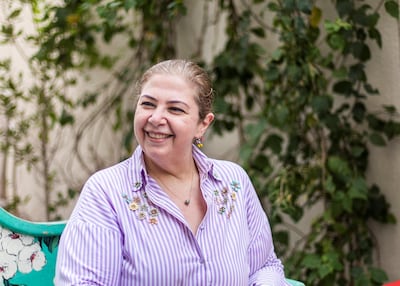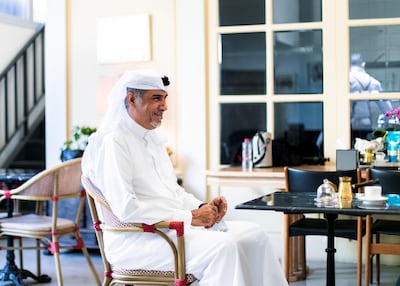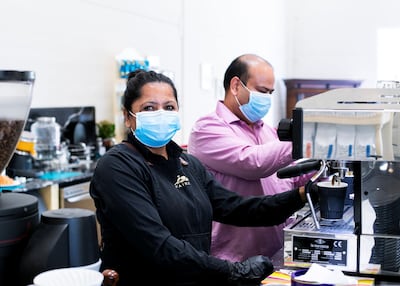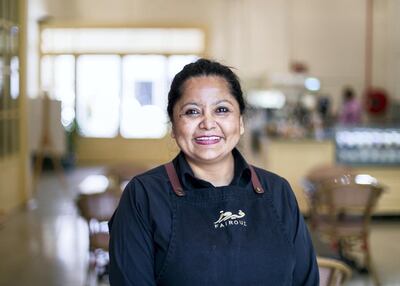Inside a small cafe in Al Quoz, Thuraya Baalbaki receives another delivery of coffee beans.
The roastery is filled with burlap sacks of raw beans and cupboards of roasted beans. Baalbaki opens one drawer after another with pride, filling the air with a heady, rich fragrance.
"This is the Turkish," she tells The National. "This is the Turkish dark roast. This is the Zayed Roast."
She points to a set of bags. “We just got this from Gesha Village, Ethiopia, and our customers were in such a hurry, they didn’t even wait, they wanted it after only two days of roasting.”
The cafe is empty but business is good.
Fairouz Coffee & Roastery is training coffee lovers who have taken to brewing their own cups at home since the Covid-19 lockdown.
The change comes as restaurants and cafes find new ways to adapt and thrive during the pandemic.
“This is a new market for us, the households that are preparing their own coffee,” Baalbaki, the roastery’s coffee consultant, says.
"At this time, it is about adaptation. The quicker you adapt to new market trends, to new rules, the better chance that you will be able to survive, you will be able to continue, you will be able to show your product."
Although Dubai's cafes and restaurants have reopened for business, fewer people are venturing out.
Many coffee aficionados ordered machines during lockdown, so courses show would-be baristas how to select the right beans, grind, blend and brew the perfect cup.
“After all, even if you have the best coffee bean, if you prepare it wrong, you will not be able to get the best cup of coffee,” says Baalbaki.
Before the pandemic, the roastery took orders for offices, hotels, restaurants and cafes.
But even as tourism slowed and offices shut, there was never a question that the city would lose its love of java.
"Coffee culture is really well-established in the Emirates," she points out. "It started with Arabic coffee, then Turkish coffee and nowadays it's taken the young generation, who are more into the Italian coffee."
So now Fairouz delivers Turkish, Arabic and espresso blends to homes in Dubai, Hatta, Al Ain and even to the desert towns west of Abu Dhabi, hundreds of kilometres away.
“The knowledge of coffee among the young generation is tremendously high,” Nasser Lootah, the cafe’s owner, notes. “They don’t accept just anything, it should be top.”
The coronavirus pandemic hit a year after he opened the business, which he started because his majlis was renowned for its brew.
His home blend of Arabic coffee is a point of pride, and developed into a love of specialty, single-origin coffee from small farms.
“Frankly speaking, it started as a hobby,” says Lootah, who also runs a landscaping company. “When we served coffee in our house, people would say the coffee is excellent, how do you do it? The idea came from that.”
This led him to Baalbaki, who grew up with her family’s roastery business on Hamra Street in Beirut, Lebanon.
“In Lebanon, we are coffee drinkers," says Baalbaki. "We developed our coffee in a Turkish way, it’s very finely ground.
“The coffee business in Lebanon is very advanced and its coffee is exported to the whole world. If you want Turkish coffee, they will get you a pack from Lebanon.”
Trade secrets from Beirut’s Hamra Street and a Dubai majlis will been taken to Nepal
The barista course will be taught by Ram Dhungel, a Nepalese barista who knew Lootah as a regular customer from another cafe years before Fairouz opened.
Dhungel works alongside his wife Nur Aryal, but the coronavirus outbreak has caused the baristas to reconsider their life plans.
Aryal will return shortly to Nepal to join their 9-year-old son, who was living in a boarding school before the pandemic. She plans to open her own cafe and roastery in Kathmandu, serving locally farmed coffee.
“There is very good coffee in Nepal because of the altitude,” says Aryal.
“My plan is to work from plant to cup. I want to pick my red [coffee] cherries, I want to roast it and I want to give it to my customer.”
Aryal joined her husband in the UAE in 2014 after encouragement from her daughter. “She said to me, ‘society should know you’ and she sent me.”
At Fairouz, she has learnt trade secrets from Beirut’s Hamra Street and a Dubai majlis that she will carry to Nepal, with the hope that one day she will greet Dubai customers in Kathmandu.
“Coffee makes the world small,” Aryal says.




